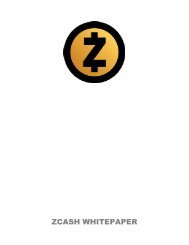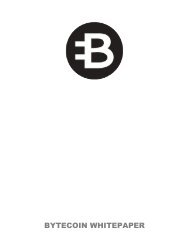Whitepaper - Ethereum Classic With Cover
You also want an ePaper? Increase the reach of your titles
YUMPU automatically turns print PDFs into web optimized ePapers that Google loves.
<strong>Ethereum</strong> <strong>Classic</strong> Documentation, Release 0.1<br />
How to get testnet Ether?<br />
See :ref: test-networks.<br />
Can a transaction be sent by a third party? i.e can transaction broadcasting be outsourced<br />
Technically yes, but there is an important restriction as opposed to bitcoin signed transactions: in ethereum the<br />
transaction has a nonce (more precisely, each account increases a counter when sending a transaction based on<br />
how many transactions total have been sent. If 3 transactions have ever been sent from the account, the account<br />
nonce would be 3).<br />
Can <strong>Ethereum</strong> contracts pull data using third-party APIs?<br />
No, <strong>Ethereum</strong> contracts cannot pull data from external information sources in this way. It is however possible to<br />
push data from external sites (e.g. weather sites, stock prices) to <strong>Ethereum</strong> contracts through transactions. There<br />
are “oracle” services that are compatible with the <strong>Ethereum</strong> network that will pull/push data to the <strong>Ethereum</strong><br />
network for a fee.<br />
Is the content of the data and contracts sent over the <strong>Ethereum</strong> network encrypted?<br />
Data and contracts on the <strong>Ethereum</strong> network are encoded, but not encrypted. Everyone can audit the behavior of<br />
the contracts and the data sent to them. However, you are always free to encrypt data locally before broadcasting<br />
it to the network.<br />
Can I store secrets or passwords on the <strong>Ethereum</strong> network?<br />
All data on <strong>Ethereum</strong> is public. It is not possible to store secrets or passwords in <strong>Ethereum</strong> contracts without<br />
it being seen by all. There is work being done to make this a possibility through code obfuscation and other<br />
techniques. A good read would be this article by Vitalik Buterin.<br />
How will <strong>Ethereum</strong> combat centralisation of mining pools?<br />
There are two primary ways that the <strong>Ethereum</strong> PoW based consensus algorithm combats mining centralisation<br />
(Source).<br />
• The first is by reducing losses due to orphaned blocks, which independent miners are more likely to experience.<br />
– This portion of the <strong>Ethereum</strong> mining algorithm, a technique referred to as GHOST, includes the headers<br />
only of recently orphaned blocks in return for a reduced reward to both the block producer and<br />
the includer of the (otherwise orphaned) block. These included orphans from “grandparent” or earlier<br />
blocks are frequently referred to as “uncle” blocks because the gender neutral term “ommer” isn’t<br />
widely known or understood.<br />
• The second way that the <strong>Ethereum</strong> PoW consensus algorithm combats mining centralisation is by its use of<br />
a Proof of Work function that is ASIC resistant.<br />
– By preventing mining from becoming dominated by specially designed and produced hardware, independent<br />
miners are kept competitive or even given an advantage in terms of their profits and/or levels<br />
of hardware investment, because they can make use of readily available commodity hardware (i.e.<br />
consumer graphics cards).<br />
How will <strong>Ethereum</strong> deal with ever increasing blockchain size?<br />
There are many discussions around blockchain scalability. This questioned has been partially answered on this<br />
<strong>Ethereum</strong> StackExchange post and this blog post from Vitalik Buterin.<br />
114 Chapter 1. Contents
















